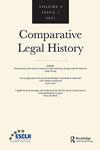欧洲视角下的可口可乐禁令
IF 0.5
Q2 LAW
引用次数: 0
摘要
爱德华·科克(Edward Coke)的《罗伊禁令》(prohiprohites del Roy, 1608)乍一看似乎是典型的英国话语:一位普通法法官主张普通法法院独立于他的国王、法院和民法法学家。然而,从欧洲的角度仔细观察,就会发现另一幅图景。与他(近)同时代的Fernando Vázquez de Menchaca、Jean Bodin和Hugo de Groot的讨论相比,事实证明,Coke的请求完全符合欧洲范围内的进程,这一进程是由法权和统治权之间、国家和公共权力的传统和唯意志主义方法之间日益紧张的关系以及公共职能的增加所导致的,这就需要在司法和行政之间进行明确的区分。必须在理论和实践中找到新的平衡。本文主要从理论上进行论述。本文章由计算机程序翻译,如有差异,请以英文原文为准。
Coke’s Prohibitions del Roy in a European perspective
Edward Coke’s Prohibitions del Roy (1608) at first sight seems a typically English discourse: a common law judge arguing for the independence of the common law courts from his king and from the conciliar courts and civil law jurists. A closer look from a European position reveals another picture, however. Compared with discussions by his (near) contemporaries Fernando Vázquez de Menchaca, Jean Bodin, and Hugo de Groot, it turns out that Coke’s plea fits neatly in a Europe-wide process resulting from growing tension between iurisdictio and imperium and between the traditional and voluntarist approaches of the state and public power, as well as an increase in public functions, that necessitated a sharp distinction between the judicature and the administration. Both in theory and practice new balances had to be found. This article focusses on the theory.
求助全文
通过发布文献求助,成功后即可免费获取论文全文。
去求助
来源期刊
CiteScore
1.70
自引率
0.00%
发文量
20
期刊介绍:
Comparative Legal History is an international and comparative review of law and history. Articles will explore both ''internal'' legal history (doctrinal and disciplinary developments in the law) and ''external'' legal history (legal ideas and institutions in wider contexts). Rooted in the complexity of the various Western legal traditions worldwide, the journal will also investigate other laws and customs from around the globe. Comparisons may be either temporal or geographical and both legal and other law-like normative traditions will be considered. Scholarship on comparative and trans-national historiography, including trans-disciplinary approaches, is particularly welcome.

 求助内容:
求助内容: 应助结果提醒方式:
应助结果提醒方式:


